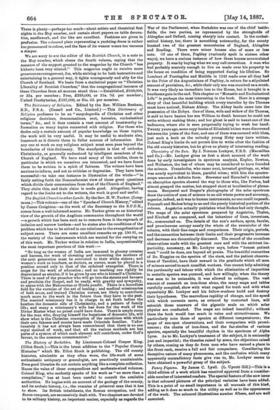The English Church in other Lands. By the Rev. H.
W. Tucker. (Long- mana.)—This volume—one of the " Epochs of Church History," edited by Canon Creighton—as the work of the Secretary to the S.P.C.K., comes from a well-informed source. Mr. Tucker gives us an historical view of the growth of the Anglican communion throughout the world —a growth which has been such as to remove from it the reproach of isolation and narrow borders—and he states also the conditions of the problem which has to be solved in our relations to the evangelisation of subject races. There are some excellent remarks on pp. 190.91, on the variety of the instruments which are wanted for the carrying on of this work. Mr. Tucker writes in relation to India, unquestionably the moat important province of this work i- " So long as the women of India are immured in gloomy zenanaa and harems, the work of elevating and converting the mothers of the next generation mast be entrusted to their white sisters ; and women's work as teachers, as doctors, as nurses, must be placed in a position second only to that of the ordained evangelist. There is scope for the work of education ; and no teaching can rightly be depreciated as secular, if it be given by one who is himself a Christian. There is need of the preacher who will go into the streets and bazaars and proclaim the Gospel, and be ready, with gravity and sympathy, to argue with the Mahometan or Hindu pundit. There is a boundless field for the exercise of the art of healing ; and medical missionaries of both sexes, and trained Christian nurses, are likely to contribute much more to the work in the future than they have in the past. The married missionary has it in charge to set forth before the heathen the domestic side of Christianity, and a pattern of family life; and many a missionary's wife has done for the work of the Divine Master what no priest could have done. There is ample room for the man who, denying himself the happiness of domestic life, will show what is the Christian conception of the asceticism with which their own fakeers and monks have made Orientals familiar. Unfor- tunately it has not always been remembered that there is no one royal method of work, and that all the various methods are but parts of a system of which each element will contribute, under God's favour, to the common consummation."


































 Previous page
Previous page